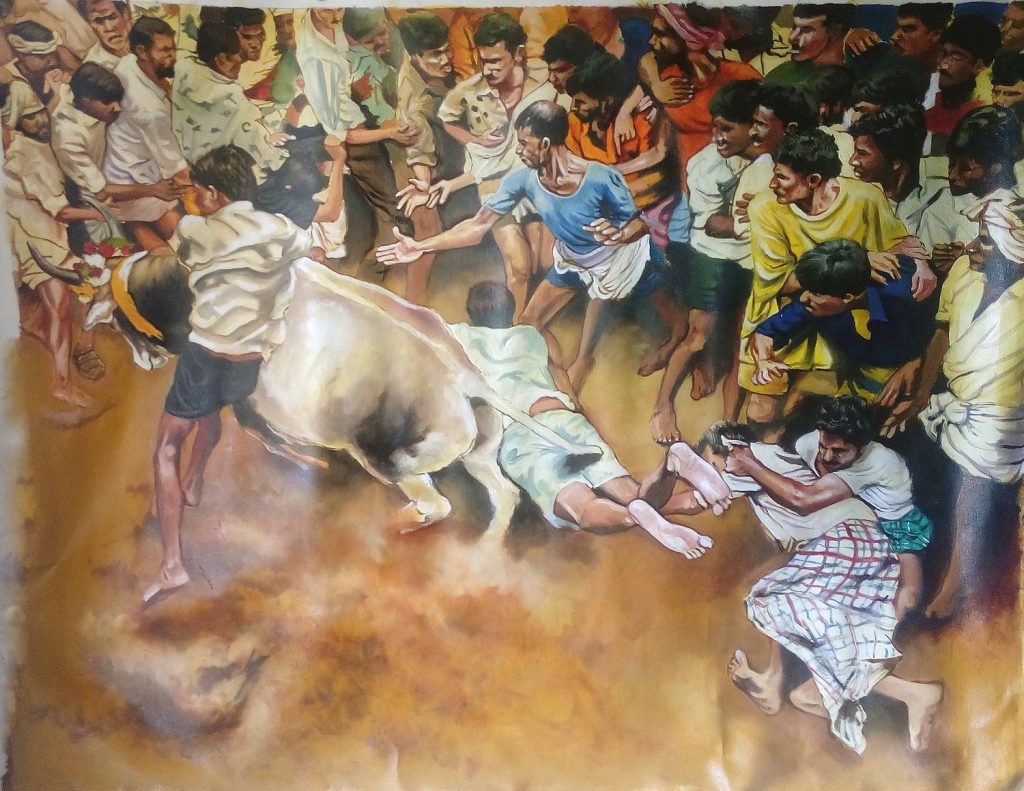By : Hench Oochappan
Jallikattu is a typically practiced culture of India celebrated in the state of Tamil Nadu on the occasion of Pongal celebration. In Jallikattu a bull is left into a local crowd of human participants who try to grab the hump of a bull as long as the bull nearly stops while bull attempts to escape.
Eru thazhuvuthal was the famous name of Jallikattu which means ‘Embracing a Bull’ and now it is known as Jallikattu, where Jalli means ‘coins’, and kattu means tied’.

oil painting by : Sreenivasa Ram Makineedi
This was a famous celebration during the rule of the Nayak King when few gold coins were wrapped in a piece of cloth and were tied to the bull’s horn. Player was supposed to embrace the hump of that bull to get the bag of coins without hitting the bull. This way Jallikattu name became famous. The seals of the Indus Valley civilization depict it, which is a proof that this sport was in vogue 5,000 years ago.
Since last decade or so there are few misconceptions running about jallikattu. If we look at media reports, every headline describes about injuries and violence in jallikattu event.
The main misconception among those is “The similarity between Spanish Bullfight and Jallikattu” The two are very different as the traditional sport of India Jallikattu is not about the injuring the bull but the embracing it.
PETA India has also banned this sport clamming this a Hurt game. It was said that bulls run because people hurt them. This is a cruelty to animals which should not be run but the reality is just opposite.
Bulls are brought to the arena one day before the event. A team of ‘Animal Welfare Officials’ inspect the bulls and give a medical certificate. On the event day the bull is left free to run. The sport consists of holding on to the hump of the bull. A bull spends less than 30 seconds time for this sport. There is no sort of torture of any animal takes place during this event.
If we go behind the scene, then we may find that story is just opposite what are pictured in front. Actually these all reports are given by the urban people who don’t even bother to check the reality so how can they understand the chain system of economy which is supported by Rural India.
The bull which are using in Jallikattu, they are the rare species of bull’s category who are 364 days in care of local people for one day of Jallikattu. If Jallikattu will be banned, then no one will be concerned of taking care these bulls and this way the particular bull breed will be disappeared like other animals. And once the bulls will be no more then how the milk production can be possible. We will have to be dependent on imported packet milk.
So the judgment should be done looking at every pros and cons of this event and behind the event.
IIP Foundation, under its initiative of “Documentation of Indian Heritage and Culture” supports Jallikattu, as it is an ancient sport of an ancient nation with an ancient practice going back millennia, Jallikattu should be preserved.





